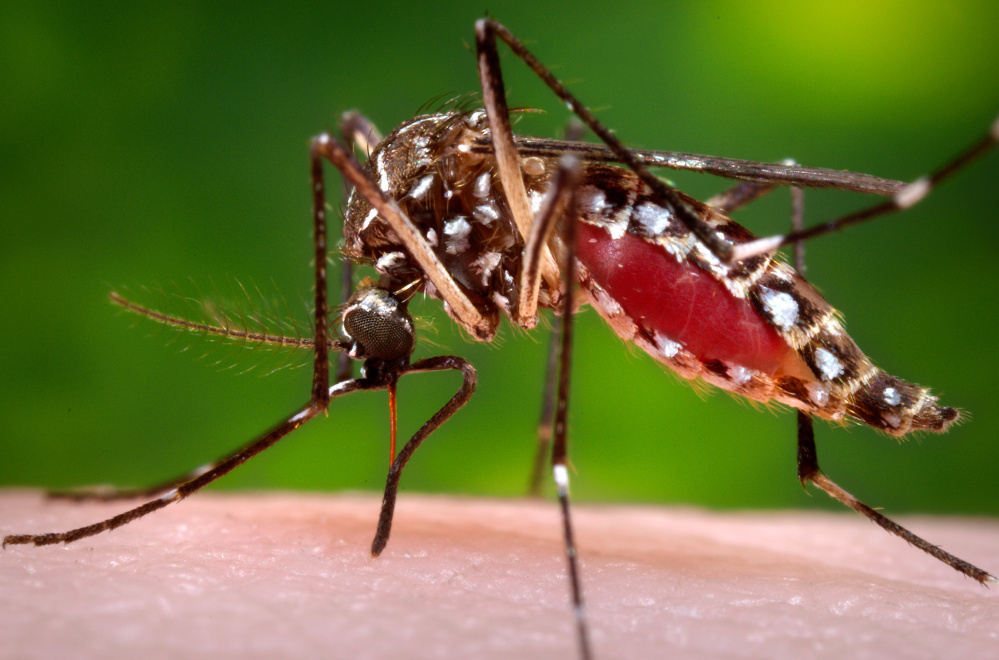A Hancock County resident over 65 years old has been infected with the Zika virus, after returning to Maine from traveling to a tropical country, the Maine Center for Disease Control and Prevention reported Thursday.
The mosquito that carries the virus – aedes aegypti – cannot live in Maine, experts say. The disease is most frequently transmitted by mosquito and on much rarer occasions by sexual contact.
“The illness itself is mild and only one in five develop any symptoms,” said Dr. Siiri Bennett, the state epidemiologist. However, health officials are concerned about the potential connection between the Zika virus and birth defects, which is why the spread of the virus in Brazil and tropical countries has made international news in recent months.
Bennett said the disease is “highly unlikely” to spread in Maine because the cold climate is inhospitable to the mosquito.
“We do not carry the mosquito here in Maine,” Bennett said. “You can’t get this from your neighbor.”
The person was not hospitalized and is recovering at home, the CDC said. The CDC is not providing more detail on the person or where he or she traveled due to patient confidentiality laws.
Twenty-five Maine residents have been or are being tested, according to the CDC. The Hancock County resident was the first to test positive for the Zika virus. The other cases were negative, but there are several cases with test results still pending.
Bennett said most of the people being tested are women who are pregnant or could be pregnant.
There may be a link between pregnant women infected with Zika and neurological birth defects, namely microcephaly, in which the baby’s head is abnormally small. An investigation by health agencies into the correlation is ongoing.
Meanwhile, health agencies are encouraging pregnant women not to travel to affected countries and if they do, to get tested for the virus.
“The common link to this virus is travel, and this finding is not unexpected,” Bennett said. “Several countries in the Caribbean, Central, and South America are experiencing outbreaks and Mainers like to travel to warm places in the winter.”
Bennett said more cases are expected in Maine, especially as people return from their tropical vacations.
Charles Lubelczyk, a field biologist with the Maine Medical Center Research Institute’s vector-borne disease lab, said the aedes aegypti mosquito dies quickly once outside of tropical climates, so there’s no cause for concern in Maine even during the summer.
“It’s always been a very tropical mosquito. The eggs need quite a bit of warmth to develop and hatch,” Lubelczyk said.
Lubelczyk said the mosquito – which also carries yellow fever and dengue fever – would even have a difficult time living in some parts of Florida and the Carolinas. There are no known cases of someone contracting the Zika virus from a mosquito that had bitten a person in the United States.
In southern Maine’s warm summer months, it might be possible for an “extremely localized” concentration of the aedes aegypti mosquito to arrive at Maine’s ports from warmer climates, but the mosquitoes would be wiped out as soon as there was a cold night, he said.
Symptoms of the virus include fever, rash, joint pain, conjunctivitis, muscle pain and headache, the CDC said, though only one in five people infected with Zika display the symptoms, which resolve on their own.
The illness usually begins two to seven days after a mosquito bite and lasts for several days to a week.
As of Feb. 17, there had been 82 reported cases of Zika in 20 states and Washington, D.C., according to the U.S. CDC.
Those at risk of contracting the Zika virus – especially women who are pregnant or could be pregnant – should wear protective clothing and insect repellent when traveling to a Zika-infected country, according to the U.S. CDC.
Joe Lawlor can be contacted at 791-6376 or at:
jlawlor@pressherald.com
Twitter: @joelawlorph
Send questions/comments to the editors.




Success. Please wait for the page to reload. If the page does not reload within 5 seconds, please refresh the page.
Enter your email and password to access comments.
Hi, to comment on stories you must . This profile is in addition to your subscription and website login.
Already have a commenting profile? .
Invalid username/password.
Please check your email to confirm and complete your registration.
Only subscribers are eligible to post comments. Please subscribe or login first for digital access. Here’s why.
Use the form below to reset your password. When you've submitted your account email, we will send an email with a reset code.